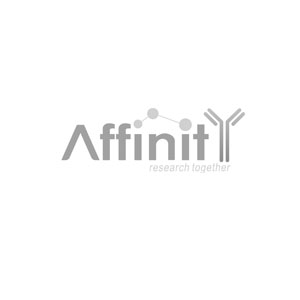KIR2DS5 Antibody - #DF9601
| Product: | KIR2DS5 Antibody |
| Catalog: | DF9601 |
| Description: | Rabbit polyclonal antibody to KIR2DS5 |
| Application: | WB IF/ICC |
| Reactivity: | Human |
| Mol.Wt.: | 34 kDa; 34kD(Calculated). |
| Uniprot: | Q14953 |
| RRID: | AB_2842797 |
Related Downloads
Protocols
Product Info
*The optimal dilutions should be determined by the end user.
*Tips:
WB: For western blot detection of denatured protein samples. IHC: For immunohistochemical detection of paraffin sections (IHC-p) or frozen sections (IHC-f) of tissue samples. IF/ICC: For immunofluorescence detection of cell samples. ELISA(peptide): For ELISA detection of antigenic peptide.
Cite Format: Affinity Biosciences Cat# DF9601, RRID:AB_2842797.
Fold/Unfold
CD158 antigen like family member G; CD158g; Flags: Precursor; Killer cell immunoglobulin like receptor 2DS5; Killer cell immunoglobulin like receptor two domains short cytoplasmic tail 5; KIR2DS5; MHC class I NK cell receptor; Natural killer associated transcript 9; Natural killer cell inhibitory receptor; NKAT 9; NKAT9;
Immunogens
- Q14953 KI2S5_HUMAN:
- Protein BLAST With
- NCBI/
- ExPASy/
- Uniprot
MSLMVISMACVAFFLLQGAWPHEGFRRKPSLLAHPGPLVKSEETVILQCWSDVMFEHFLLHREGTFNHTLRLIGEHIDGVSKGNFSIGRMTQDLAGTYRCYGSVTHSPYQLSAPSDPLDIVITGLYEKPSLSAQPGPTVLAGESVTLSCSSRSSYDMYHLSREGEAHERRLPAGPKVNRTFQADFPLDPATHGGTYRCFGSFRDSPYEWSKSSDPLLVSVTGNSSNSWPSPTEPSSETGNPRHLHVLIGTSVVKLPFTILLFFLLHRWCSNKKNASVMDQGPAGNRTVNREDSDEQDHQEVSYA
PTMs - Q14953 As Substrate
| Site | PTM Type | Enzyme | Source |
|---|---|---|---|
| N178 | N-Glycosylation | Uniprot |
Research Backgrounds
Activating natural killer (NK) receptor that recognizes C2 epitopes of HLA-C alleles. Bridging the innate and adaptive immune systems, NK cells express a number of cell surface receptors which either inhibit or stimulate their cytotoxicity. Able to activate NK cells citotoxicity and cytokine production such as IFNG. Receptor functions are attenuated even lost in some alleles, such as KIR2DS5*002 reprensented in this entry.
N-glycosylated, glycosylation varies depending on the allele which alters cell surface expression levels.
Cell membrane>Single-pass type I membrane protein>Extracellular side.
Expressed on a discrete subset of peripheral blood NK cells.
Interacts with TYROBP.
Belongs to the immunoglobulin superfamily.
Research Fields
· Organismal Systems > Immune system > Antigen processing and presentation. (View pathway)
· Organismal Systems > Immune system > Natural killer cell mediated cytotoxicity. (View pathway)
Restrictive clause
Affinity Biosciences tests all products strictly. Citations are provided as a resource for additional applications that have not been validated by Affinity Biosciences. Please choose the appropriate format for each application and consult Materials and Methods sections for additional details about the use of any product in these publications.
For Research Use Only.
Not for use in diagnostic or therapeutic procedures. Not for resale. Not for distribution without written consent. Affinity Biosciences will not be held responsible for patent infringement or other violations that may occur with the use of our products. Affinity Biosciences, Affinity Biosciences Logo and all other trademarks are the property of Affinity Biosciences LTD.
